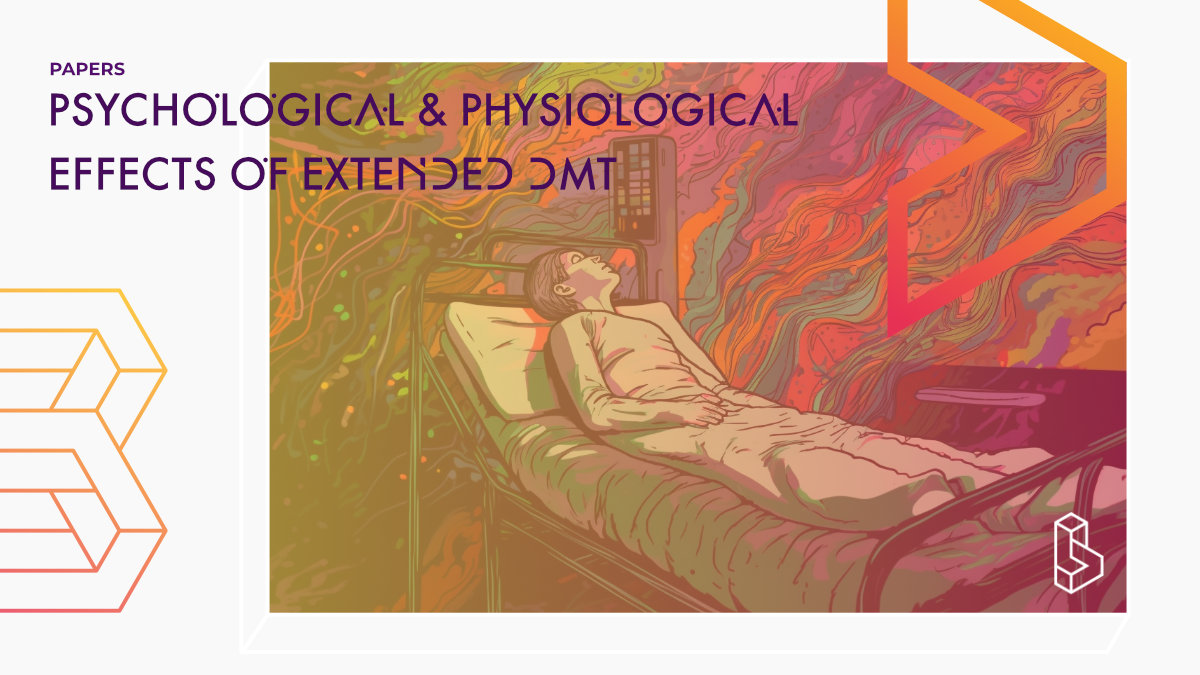In this within-subject, placebo-controlled study (n=11), participants received four doses of DMT (6-18 mg bolus + infusion over 30 minutes). Subjective effects were kept stable over the infusion, while plasma DMT concentrations increased (indicating acute psychological tolerance). Findings indicate that extended DMT infusion is safe and effective in healthy subjects.
Abstract of Psychological and physiological effects of extended DMT
“Background: N,N-Dimethyltryptamine (DMT) is a serotonergic psychedelic that when injected as a bolus intravenous injection induces a rapid and transient altered state of consciousness. Its marked and novel subjective effects make DMT a powerful tool for the neuroscientific study of consciousness and preliminary results show its potential role in treating mental health conditions.
Aims: In a within-subjects, placebo-controlled study, we investigated a novel method of DMT administration involving a bolus injection paired with a constant-rate infusion, with the goal of extending the DMT experience.
Methods: Pharmacokinetic parameters of DMT estimated from plasma data of a previous study of bolus intravenous DMT were used to derive dose regimens necessary to keep subjects in steady levels of immersion into the DMT experience over an extended period of 30 minutes, and four dose regimens were tested.
Results: The present method is effective for extending the DMT experience in a stable and tolerable fashion. While subjective effects were maintained over the period of active infusion, anxiety ratings remained low and heart rate habituated within 15 minutes, indicating psychological and physiological safety of extended DMT. Plasma DMT concentrations increased consistently starting ten minutes into DMT administration, whereas psychological effects plateaued into the desired steady state, suggesting the development of acute psychological tolerance to DMT.
Conclusion: Taken together, these findings demonstrate the safety and effectiveness of continuous IV DMT administration, laying the groundwork for the further development of this method of administration for basic and clinical research.“
Authors: Lisa X. Luan, Emma Eckernäs, Michael Ashton, Fernando E. Rosas, Malin V. Uthaug, Alexander Bartha, Samantha Jagger, Kiara Gascon-Perai, Lauren Gomes, David J. Nutt, David Erritzøe, Robin L. Carhart-Harris & Christopher Timmermann
Summary of Psychological and physiological effects of extended DMT
DMT provides a unique immersion experience into a richly content-full experience, while feeling decoupled from the immediate environmental sensorium. It has gained increased interest for its potential therapeutic benefits in treating mental health disorders such as depression.
DMT is rapidly metabolized in the gastrointestinal system by monoamine oxidase (MAO), rendering it psychologically inactive. It can be inhaled (vaping/smoking) or administered parenterally (e.g., intravenously as a bolus) for short durations.
Find this paper
Psychological and physiological effects of extended DMT
https://doi.org/10.1177/02698811231196877
Open Access | Google Scholar | Backup | 🕊
Cite this paper (APA)
Luan, L., Eckernäs, E., Ashton, M., Rosas, F., Uthaug, M., Bartha, A., ... & Timmermann, C. (2023). Psychological and physiological effects of extended DMT.
Study details
Compounds studied
DMT
Topics studied
Healthy Subjects
Safety
Study characteristics
Original
Placebo-Controlled
Single-Blind
Within-Subject
Participants
11
Humans
Authors
Authors associated with this publication with profiles on Blossom
Chris TimmermannChris Timmerman is a postdoc at Imperial College London. His research is mostly focussed on DMT.
David Erritzoe
David Erritzoe is the clinical director of the Centre for Psychedelic Research at Imperial College London. His work focuses on brain imaging (PET/(f)MRI).
Robin Carhart-Harris
Dr. Robin Carhart-Harris is the Founding Director of the Neuroscape Psychedelics Division at UCSF. Previously he led the Psychedelic group at Imperial College London.
David Nutt
David John Nutt is a great advocate for looking at drugs and their harm objectively and scientifically. This got him dismissed as ACMD (Advisory Council on the Misuse of Drugs) chairman.
Institutes
Institutes associated with this publication
Imperial College LondonThe Centre for Psychedelic Research studies the action (in the brain) and clinical use of psychedelics, with a focus on depression.
Compound Details
The psychedelics given at which dose and how many times
DMT 6 - 18mg | 4x
Linked Research Papers
Notable research papers that build on or are influenced by this paper
Acute effects of intravenous DMT in a randomized placebo-controlled study in healthy participantsThis double-blind, placebo-controlled crossover trial (n=27) investigated different intravenous DMT administration regimens, including placebo, low and high infusion (0.6-1mg/min), and bolus doses (15-25mg) combined with low and high infusion. The study found that bolus doses rapidly induced intense psychedelic effects, with infusions causing slowly increasing, dose-dependent effects.
Psychological effects of (S)-ketamine and N,N-dimethyltryptamine (DMT): a double-blind, cross-over study in healthy volunteers
This double-blind study (n=9) of the psychological effects of (s)-ketamine and DMT found the positive effects of DMT, and the negative effects of ketamine most resembling those symptoms of schizophrenia.

